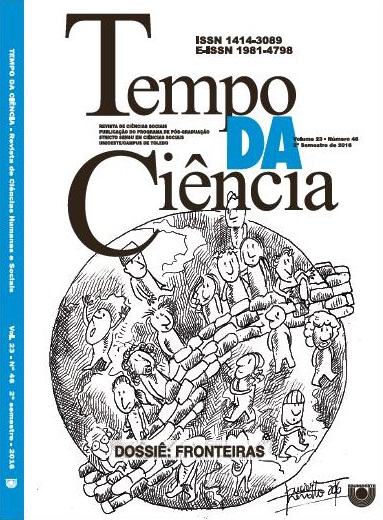As dinâmicas do monopólio da violência e do controle em um território transfronteiriço e amazônico
DOI:
https://doi.org/10.48075/rtc.v23i46.16129Palavras-chave:
Monopólio da violência, fronteira, Estado, Amazônia.Resumo
O artigo analisa práticas relacionadas ao controle e ao monopólio da violência na tríplice fronteira amazônica. A investigação acompanhou ações do Exército e da Polícia Federal na região do Alto Solimões, em especial, na região de confluência entre Brasil, Peru e Colômbia. Em linhas gerais, o trabalho é resultado de um empreendimento de pesquisa que durou três anos, com acompanhamento sistemático de operações para controle das fronteiras e interlocução com os responsáveis pelo trabalho policial na região. Ao considerar o monopólio da violência uma ação política de Estado, a investigação buscou as práticas estruturantes e as dificuldades enfrentadas por forças policiais para a realização dessa finalidade. O estudo propõe que o monopólio da violência é um projeto político tensionado pelas dinâmicas transfronteiriças. Violências, ilegalismos e crimes, em uma área de extensão e ecossistema peculiar, representam desafio contínuo para forças que devem agir em nome de uma razão de Estado cuja finalidade é o controle efetivo do território nacional. Os resultados mostram como militares e policiais federais vivenciam problemas efetivos para a realização da perspectiva política que, em tese, orienta seus trabalhos como agentes responsáveis por um princípio basilar do Estado moderno.Downloads
Publicado
Como Citar
Edição
Seção
Licença
Aviso de Direito Autoral Creative Commons
Política para Periódicos de Acesso Livre
Autores que publicam nesta revista concordam com os seguintes termos:
1. Autores mantém os direitos autorais e concedem à revista o direito de primeira publicação, com o trabalho simultaneamente licenciado sob a Licença Creative Commons Attribution que permite o compartilhamento do trabalho com reconhecimento da autoria e publicação inicial nesta revista.
2. Autores têm autorização para assumir contratos adicionais separadamente, para distribuição não-exclusiva da versão do trabalho publicada nesta revista (ex.: publicar em repositório institucional ou como capítulo de livro), com reconhecimento de autoria e publicação inicial nesta revista.
3. Autores têm permissão e são estimulados a publicar e distribuir seu trabalho online (ex.: em repositórios institucionais ou na sua página pessoal) a qualquer ponto antes ou durante o processo editorial, já que isso pode gerar alterações produtivas, bem como aumentar o impacto e a citação do trabalho publicado (Veja O Efeito do Acesso Livre).
Licença Creative Commons
Esta obra está licenciada com uma Licença Creative Commons Atribuição-NãoComercial-CompartilhaIgual 4.0 Internacional, o que permite compartilhar, copiar, distribuir, exibir, reproduzir, a totalidade ou partes desde que não tenha objetivo comercial e sejam citados os autores e a fonte.


